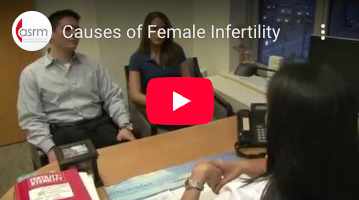Infertility in Women
Causes of female infertility overview
Infertility is defined as not being able to become pregnant within one year of trying for women under the age of 35, or within six months of trying for women age 35 or above. However, infertility can involve one or both partners.
In general, one-third of cases involve only the male partner. In another third of cases, the cause of infertility only involves the female partner. In the remaining cases of infertility, the cause involves both male and female partners, or is unknown.
Common causes of male infertility include erectile dysfunction, low sperm quality or quantity and ejaculatory dysfunction.
Learn More About Male Infertility
Common causes of infertility in women include problems with ovulation, cervical dysfunctions, endometriosis or genetic conditions. Specific causes of female infertility include:
Age
Women are born with 1-2 million eggs. From menarche (the first period) to the age of 30, the number of eggs decreases by three percent to five percent per year. This reduction in fertility is much greater after age 40.
Ovulation disorders
Ovulation disorders, such as anovulation, prevent the ovaries from releasing eggs. They are a common cause of infertility (approximately 25 percent of all infertility cases). If a woman is ovulating infrequently, or not having periods at all, there is a chance she will experience infertility.
Uterine or cervical abnormalities
Uterine abnormalities interfere with egg fertilization or embryo development and often include:
- Fibroids – Benign tumors in the wall of the uterus may rarely cause infertility by blocking the fallopian tubes. More often, fibroids may deform the uterine cavity, interfering with implantation of the fertilized egg.
- Endometriosis – Occurs when endometrial tissue implants and grows outside of the uterus, often affecting the function of the ovaries, uterus and fallopian tubes.
- Polyps – There are two types of polyps that affect fertility: uterine polyps and cervical polyps. Uterine polyps are lesions of the uterine wall. Cervical polyps are smooth growths in the cervix, which is the passage between the uterus and vagina. Polyps can affect the fertilization or embryo growth process.
- Adhesions – Bands of scar tissue that form between or inside of abdominal organs. Uterine adhesions are also known as Asherman’s syndrome. In severe cases, adhesions may block or distort the inside of the uterus making it difficult for a pregnancy to develop to full term.
Hormone imbalance
Successful ovulation and implantation of a fertilized egg relies on an intricate balance of hormones. Any disruption in a woman’s hormone balance can prevent ovulation from happening, or make it difficult for a fertilized egg to implant in the uterine lining. Lack of ovulation eliminates the possibility of fertilization, and therefore pregnancy.
Polycystic ovary syndrome is another common cause of infertility caused by hormonal imbalances. While disorders of thyroid function and abnormal production of prolactin by the pituitary gland can also be causes, the majority of PCOS is related to excessive production of insulin in the body, which may lead to an excess of male hormone production in the ovaries.
This in turn is responsible for a failure of the eggs to mature. The end result is an increased number of small cysts (polycystic) in the ovaries. The cysts are not the cause of infertility, but the result of excessive male hormone production related to too much insulin is. This excess of male hormone can lead to other symptoms, such as hirsutism.
Learn More About PCOS Learn More About Hormone Imbalance
Fallopian tube damage or blockage
Fertilization occurs after the sperm have traveled through the uterus to meet the egg in the woman’s fallopian tubes. The fertilized egg develops into an embryo, and then travels down the tube into the uterus, where it develops into a fetus. If there is damage to the fallopian tube or blockage, it is called tubal disease. Tubal disease will prevent sperm and egg from joining and may cause ectopic pregnancy, which accounts for about 35 percent of infertility problems.
If you have a pelvic inflammatory disease, usually caused by sexual transmitted infection, adhesions or endometriosis, salpingitis – inflammation of the fallopian tube – may occur. Salpingitis can lead to infertility because eggs released during ovulation can’t connect with sperm. The more frequently infections occur, the greater the risk of infertility.
Learn More About Tubal Infertility
Cancer & its treatments
Certain cancers often critically damage female fertility. Radiation and chemotherapy may affect a woman’s ability to reproduce.
Learn More About Fertility Preservation
Sexually transmitted diseases
STDs such as chlamydia can damage a woman’s fallopian tubes and alter normal anatomical relations, causing infertility; other STDs can also affect one or both partners’ fertility.
Unexplained infertility
Unexplained infertility is the diagnosis if the man’s semen analysis is normal, the woman is ovulating and her fallopian tubes are open. If all fertility tests are normal, then the reason for infertility cannot be defined. Couples with unexplained infertility often have a very high success rate with fertility treatments like intrauterine insemination (IUI) or in vitro fertilization (IVF).
Learn More About Unexplained Infertility
Uterine Abnormalities, Cervical Abnormalities & Fertility
Uterine and cervical abnormalities, whether congenital or acquired, pose significant challenges to women’s reproductive health by impeding fertility and complicating pregnancy. Symptoms such as abnormal bleeding, discomfort, and difficulty conceiving are common indicators, with diagnosis typically involving a comprehensive evaluation by fertility specialists including examinations, medical history reviews, and various tests.
Learn More About Uterine & Cervical Abnormalities
Recurrent pregnancy loss (miscarriage)
Although up to 25 percent of pregnancies result in a miscarriage, three or more miscarriages indicates an infertility condition called recurrent pregnancy loss. One or more of the fertility problems noted above can cause recurrent pregnancy loss.
Understanding Infertility – The Basics
A series of patient education videos by the American Society for Reproductive Medicine.
Are you struggling to get pregnant and feel you might have infertility? Schedule an initial consultation with one of our doctors to explore your treatment options.

